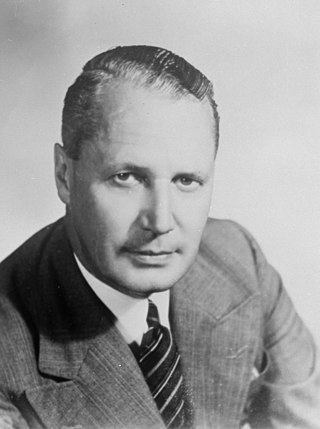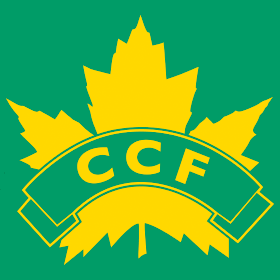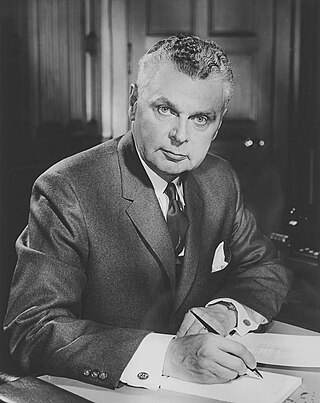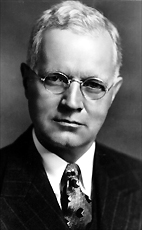Related Research Articles

The Ontario Liberal Party is a political party in the province of Ontario, Canada. The party has been led by interim leader John Fraser since August 2022.

The Progressive Conservative Party of Ontario, often shortened to the Ontario PC Party or simply the PCs, colloquially known as the Tories, is a centre-right political party in Ontario, Canada.

The Ontario New Democratic Party is a social-democratic political party in Ontario, Canada. The party currently forms the Official Opposition in Ontario following the 2018 general election. It is a provincial section of the federal New Democratic Party. It was formed in October 1961 from the Co-operative Commonwealth Federation and the Ontario Federation of Labour (OFL).
William Earl Rowe,, was a politician in Ontario, Canada. He served as the 20th Lieutenant Governor of Ontario from 1963 to 1968.
An interim leader, in Canadian politics, is a party leader appointed by the party's legislative caucus or the party's executive to temporarily act as leader when a gap occurs between the resignation or death of a party leader and the election of their formal successor. Usually a party leader retains the leadership until a successor is formally chosen — however, in some situations this is not possible, and an interim leader is thus appointed by the party's caucus or the party executive. An interim leader may also be appointed while a leader is on a leave of absence due to poor health or some other reason, and then relinquish the position upon the leader's return.

Harry Corwin Nixon was a Canadian politician and briefly the 13th premier of Ontario in 1943. He is both the longest-serving member in the history of the Ontario legislature and the shortest-serving premier of Ontario.

John Bracken was a Canadian agronomist and politician who was the 11th and longest-serving premier of Manitoba (1922–1943) and later the leader of the Progressive Conservative Party of Canada (1942–1948).

Thomas Laird Kennedy was a politician in Ontario, Canada, and served briefly as the 15th premier of Ontario, from 1948 to 1949. He was first elected as the Conservative member for Peel in the 1919 provincial election. He had been a longtime resident of Streetsville, Ontario, where he was master of River Park Masonic Lodge in 1908 and 1909.

George Alexander Drew was a Canadian politician. He served as the 14th premier of Ontario from 1943 to 1948 and founded a Progressive Conservative dynasty that would last 42 years. He later served as leader of the federal Progressive Conservative Party and Leader of the Official Opposition from 1948 to 1956.
The first Progressive Conservative Party of Canada leadership election was held in 1927, when the party was called the Conservative Party. Prior to then the party's leader was chosen by the caucus or in several cases by the Governor General of Canada designating a Conservative MP or Senator to form a government after the retirement or death of an incumbent Conservative Prime Minister.
James Earl Lawson, was a Canadian politician and lawyer.
This page lists the results of leadership elections within the Progressive Conservative Party of Ontario.

The Co-operative Commonwealth Federation – The Farmer-Labor Party of Ontario, or more commonly known as the Ontario CCF, was a democratic socialist provincial political party in Ontario that existed from 1932 to 1961. It was the provincial wing of the federal Co-operative Commonwealth Federation (CCF). The party had no leader in the beginning, and was governed by a provincial council and executive. The party's first Member of the Legislative Assembly (MLA) was elected by voters in the 1934 Ontario general election. In the 1937 general election, no CCF members were elected to the Ontario Legislature. In 1942, the party elected Toronto lawyer Ted Jolliffe as its first leader. He led the party to within a few seats of forming the government in the 1943 general election; instead, it formed the Official Opposition. In that election, the first two women were elected to the Ontario Legislature as CCFers: Agnes Macphail and Rae Luckock. The 1945 election was a setback, as the party lost most of its seats in the Legislature, including Jolliffe's seat. The party again became the Official Opposition after the 1948 general election, and defeated the Conservative premier George Drew in his seat, when Bill Temple unexpectedly won in the High Park constituency. The middle and late 1940s were the peak years for the Ontario CCF. After that time, its electoral performances were dismal, as it was reduced to a rump of two seats in the 1951 election, three seats in the 1955 election, and five seats in the 1959 election. Jolliffe stepped down as leader in 1953, and was replaced by Donald C. MacDonald.
William James Stewart was a Canadian politician. He was also a member of the Orange Order in Canada. Stewart also owned and operated the Bates and Dodds Funeral Home on Queen Street West in Toronto.
The Conservative Party of Ontario held its first ever leadership election on December 2, 1920. The event was held to select a replacement for outgoing leader and former Premier of Ontario Sir William Hearst. The party selected George Howard Ferguson, who would become premier after the Ontario general election of 1923.
A Conservative Party of Ontario leadership election was held on the week of May 25, 1936 at the Royal York Hotel in Toronto culminating in a ballot for leader on May 28, 1936 to replace retiring Conservative leader and former premier George S. Henry, who had resigned after his party lost the 1934 provincial election to Mitchell Hepburn's Liberals. The party selected federal Member of Parliament Earl Rowe on the second ballot. The results for the first ballot were not originally going to be read out but various delegates shouted from the floor demanding the results and the vote totals were read out.

The 1998 Progressive Conservative leadership election was held on October 24 and November 14, 1998 to choose a successor to Jean Charest. This was the first time the Progressive Conservatives used a one member, one vote system to choose a leader rather than a delegated leadership convention, which has been the norm since 1927. The 1998 election used a point system that allocated 100 points to each riding, regardless of the number of votes cast in the riding. The candidate who won a majority of points would win the leadership. All party members were eligible to cast a vote. If no candidate received a majority of points on the first ballot, the lowest ranking candidate would be automatically eliminated and a second ballot was to be held using a preferential ballot if more than two candidates remained. The 100-point-per-riding system was again used by the Conservative Party of Canada in their leadership elections.

The 1956 Progressive Conservative leadership election was held to choose a leader for the Progressive Conservative Party of Canada. The convention was held at the Ottawa Coliseum in Ottawa, Ontario, Canada. The convention began on December 13, 1956 with voting occurring on December 14 when John Diefenbaker was elected the new leader.

The 1948 Progressive Conservative leadership election was held to choose a leader for the Progressive Conservative Party of Canada. The convention was held at the Ottawa Coliseum in Ottawa, Ontario, Canada. Voting occurred on October 2, 1948. Premier of Ontario George A. Drew was elected as the party's new leader.

A National Conservative leadership convention began on July 5, 1938, culminating in a leadership ballot on July 7. The Conservative Party of Canada chose Robert James Manion to succeed former Prime Minister R. B. Bennett as party leader.